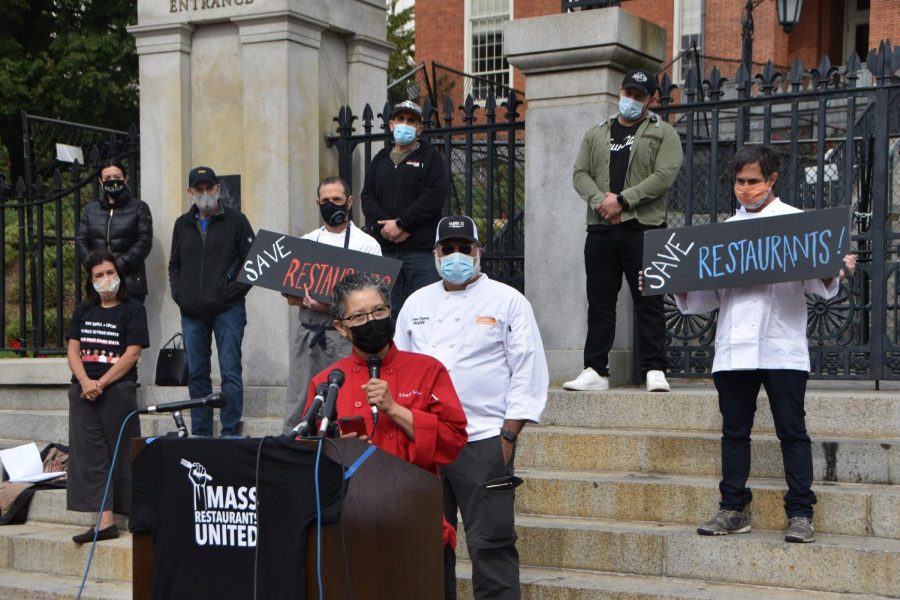Local restaurants urge the state to pass relief bill
Restaurant owners and other members of MRU rally on the steps of the State House.
October 22, 2020
As many businesses, specifically restaurants, struggle due to the pandemic, Massachusetts Restaurants United, or MRU, rallied on the front steps of the State House Sept. 22 in support of the pending Economic Development Bill.
The Economic Development Bill includes a Distressed Restaurant Fund that would give grants to struggling independent restaurants, place caps on third-party delivery fees and address interest accumulation on deferred meals tax. The grants would be issued to cover rent, payroll, insurance, licences and loans, among other expenses.
Both the Senate and the House have passed the fund; however, the Economic Development Bill is still yet to be passed. MRU, in collaboration with the Boston Black Hospitality Coalition, Boston Restaurant Coalition and the Massachusetts Restaurant Association, helped write the bill.
In the last three months, 20% of Massachusetts restaurants have permanently closed. As patio season comes to an end and a cold Boston winter approaches, local restaurant owners and members of the MRU spoke with passionate urgency.
Jose Duarte, chef and owner of Taranta and Tambo22 spoke through tears about having to close his twenty year-old restaurant Taranta. With the loss of all catering jobs, holiday parties, sporting events and even take-out for his customers, the restaurant struggled.
“We really need help. We are in distress,” Duarte said. “I have a business that I am trying to save now and we need the bill to pass so we can continue to serve this community.”
A central concern that was echoed throughout the press conference was the inability to maintain profit margins during upcoming winter months. With the culinary tourism season nearly at a close, restaurants must prepare for less customers.
“When we would normally use what would be the 100% of our profitability of August to carry us through the morbid winter, the reality is most of our restaurants operated between 50-60%,” said Nancy Caswell, chef and owner of Ceia, BRINE and Oak + Rowan.
The limits on dine-in seating also create an issue. Restaurants are struggling to compensate for the reduced capacity required to maintain social distancing, and as winter comes, outdoor patios will become less practical. In addition, some customers are still not comfortable with dining inside.
Because of this, outdoor heaters are in high demand and are “almost impossible to get,” as restaurants cannot access or afford them, Duarte said.
Another central topic of discussion was the severe effect third-party delivery fees have on profit margins. After Gov. Charlie Baker announced a state-wide shutdown of bars and restaurants for dine-in businesses from March 17 to April 6, eateries relied on take-out orders and delivery services to draw in customers. However, third-party delivery services such as Grubhub, Ubereats and Postmates are charging restaurants a 20-30% delivery fee, squeezing profits even slimmer. The House’s legislation proposes a 15% cap on the fees that delivery companies charge restaurants during the COVID-19 crisis.
Chef Cheryl Straughter, cofounder of the Boston Black Hospitality Coalition and owner of Soleil restaurant in Nubian Square, spoke about her restaurant’s experience with delivery services.
“I had a [delivery] sale for $23.50. $1.65 came out for taxes, $7.05 came out for commission, $6.00 came for their tablet fee. So that left Soleil with $12.10,” she said. “At some point, you have to make the hard decision — is it worth it?”
Jody Adams, founding member of MRU and chef-owner of Porto, Trade and Saloniki, said the most important thing customers can do to support their favorite local restaurants is to pick up directly from the restaurant rather than use delivery, along with sending notes to local politicians and legislators.
“Without restaurants, neighborhoods are left empty of culture and character,” Adams said. “People in the restaurant business don’t like to ask for help. We’re gritty and independent. We are fighters.”







